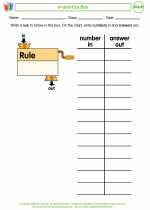Series in Mathematics
A series in mathematics is the sum of the terms of a sequence. A sequence is a list of numbers in a specific order, and a series is the sum of all the terms in the sequence. Series are important in mathematics and have many real-world applications, including in finance, physics, and engineering.
Types of Series
There are different types of series, including arithmetic series, geometric series, and infinite series.
Arithmetic Series
An arithmetic series is the sum of the terms of an arithmetic sequence. In an arithmetic sequence, each term is obtained by adding a constant value to the previous term. The sum of the first n terms of an arithmetic series can be found using the formula:
Sn = n/2[2a + (n - 1)d]
where Sn is the sum of the first n terms, a is the first term, d is the common difference, and n is the number of terms.
Geometric Series
A geometric series is the sum of the terms of a geometric sequence. In a geometric sequence, each term is obtained by multiplying the previous term by a constant value. The sum of the first n terms of a geometric series can be found using the formula:
Sn = a(1 - rn) / (1 - r)
where Sn is the sum of the first n terms, a is the first term, r is the common ratio, and n is the number of terms.
Infinite Series
An infinite series is a series that has an infinite number of terms. Some infinite series have a sum, while others do not. Convergence and divergence are important concepts when dealing with infinite series. Convergent series have a finite sum, while divergent series do not.
Study Guide for Series
- Understand the difference between a sequence and a series.
- Learn the formulas for finding the sum of arithmetic and geometric series.
- Practice identifying whether a series is arithmetic, geometric, or infinite.
- Study convergence and divergence of infinite series.
- Work on real-world problems involving series, such as financial calculations or physical applications.
Understanding series is important in many areas of mathematics and has practical applications in various fields. Practice solving problems and working with different types of series to strengthen your understanding of this topic.
.◂Math Worksheets and Study Guides Seventh Grade. Introduction to Functions
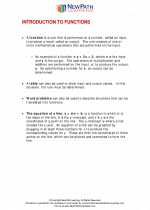
 Activity Lesson
Activity Lesson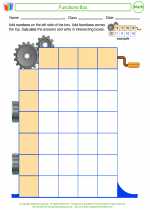
 Worksheet/Answer key
Worksheet/Answer key
 Worksheet/Answer key
Worksheet/Answer key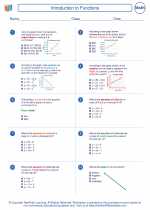
 Worksheet/Answer key
Worksheet/Answer key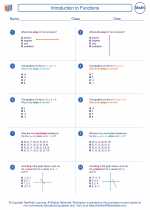
 Worksheet/Answer key
Worksheet/Answer key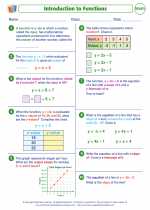
 Worksheet/Answer key
Worksheet/Answer key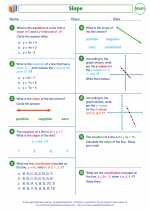
 Worksheet/Answer key
Worksheet/Answer key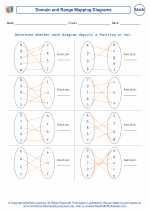
 Worksheet/Answer key
Worksheet/Answer key